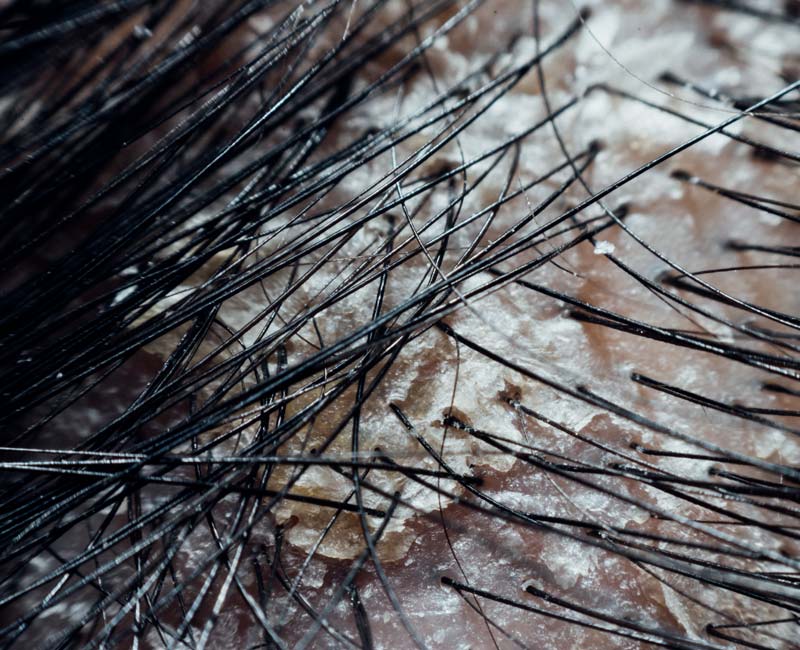Chronic dandruff is caused by irritated, oily skin, dry skin, a yeast-like fungus that feeds on oils on the scalp, sensitivity to hair care products, and other skin conditions such as psoriasis and eczema. The best treatment for chronic dandruff includes pyrithione zinc shampoos, salicylic acid shampoos, and selenium sulfide shampoos.
While dandruff cannot be cured permanently, it can be effectively controlled with proper treatment and hair care habits. Using medicated shampoos that contain active ingredients like ketoconazole, pyrithione zinc, or salicylic acid can help manage and control dandruff. Seborrheic dermatitis is the medical term for excessive dandruff, which mainly affects the scalp and causes scaly patches, inflamed skin, and stubborn dandruff.

Understanding Chronic Dandruff
Chronic dandruff, characterized by persistent flakes and scalp irritation, can be effectively treated with various medicated shampoos containing active ingredients like pyrithione zinc, salicylic acid, or ketoconazole. While it cannot be cured permanently, consistent use of these shampoos and proper hair care habits can help control dandruff.
What Is Chronic Dandruff?
Chronic dandruff, also known as seborrheic dermatitis, is a common scalp condition that causes the skin to become flaky and itchy. It is characterized by stubborn, persistent dandruff flakes and red, irritated skin. While dandruff can affect people of all ages, it is more commonly seen in adults.
Dandruff is not simply dry skin. It is a combination of excessive oil production, an overgrowth of a yeast-like fungus called malassezia, and inflammation of the scalp. These factors disrupt the normal shedding of dead skin cells, leading to the formation of visible flakes.
If left untreated, chronic dandruff can lead to self-consciousness, discomfort, and even hair loss in severe cases. That’s why it is important to understand the causes and seek proper treatment to effectively manage and control dandruff.
Causes Of Chronic Dandruff
The exact cause of chronic dandruff is not fully understood, but it is believed to be a combination of various factors. Here are some common causes:
- Irritated, oily skin: Excessive oil production on the scalp can contribute to the development of dandruff. This oily environment provides an ideal breeding ground for the yeast-like fungus, Malassezia.
- Dry skin: Contrary to popular belief, dandruff is not always caused by dry skin. However, individuals with dry skin may be more prone to developing dandruff because their flaky skin cells are more visible.
- Yeast-like fungus (malassezia): Malassezia is a naturally occurring fungus that lives on the scalps of most adults. However, an overgrowth of this fungus can disrupt the normal balance of the scalp, leading to dandruff.
- Sensitivity to hair care products (contact dermatitis): Some people may experience an allergic reaction or sensitivity to certain hair care products, such as shampoos, conditioners, or styling products. This can lead to scalp inflammation and dandruff.
- Other skin conditions: Certain skin conditions, such as psoriasis and eczema, can coexist with dandruff and contribute to its severity. These conditions cause inflammation and flaking of the skin, which can worsen dandruff symptoms.
Understanding the underlying causes of chronic dandruff can help you make informed decisions about treatment options. It’s important to consult with a dermatologist or healthcare professional to determine the most suitable approach for managing your specific condition.

Treatment Options For Chronic Dandruff
Discover effective treatment options for chronic dandruff, including pyrithione zinc shampoos, salicylic acid shampoos, and selenium sulfide shampoos. Learn how to manage and control dandruff with proper hair care habits and medicated shampoos containing active ingredients.
Medicated Shampoos
Medicated shampoos are often the first line of defense against chronic dandruff. These shampoos contain active ingredients that target the underlying causes of dandruff, such as irritation, oiliness, and fungal overgrowth. Here are some commonly used medicated shampoos for treating chronic dandruff:
- Pyrithione zinc shampoos (DermaZinc, Head & Shoulders, others): These shampoos help to reduce the growth of yeast on the scalp, which is one of the major culprits behind chronic dandruff.
- Shampoos containing salicylic acid (Jason Dandruff Relief Treatment Shampoo, Baker P&S, others): Salicylic acid helps to exfoliate the scalp, removing dead skin cells and preventing their buildup.
- Selenium sulfide shampoos (Head & Shoulders Intensive, Selsun Blue, others): Selenium sulfide has antifungal properties and can effectively control the growth of fungi on the scalp, reducing dandruff.
These medicated shampoos should be used according to the instructions provided and can usually be used daily or a few times a week, depending on the severity of dandruff. It’s important to note that results may take time, so consistency is key when using medicated shampoos for chronic dandruff treatment.
Other Treatment Methods
In addition to medicated shampoos, there are other treatment methods that can be effective in managing chronic dandruff:
- Topical corticosteroids: These are prescribed by dermatologists and can help to reduce inflammation and itchiness associated with dandruff. They should be used only under medical supervision and for a limited period of time.
- Anti-fungal treatments: If a yeast-like fungus is identified as the cause of dandruff, your doctor may prescribe antifungal creams or lotions to be applied to the scalp.
- Home remedies: Some people find relief from chronic dandruff by using natural remedies such as tea tree oil, apple cider vinegar, or coconut oil. These remedies can help soothe the scalp and reduce itching and flaking.
It’s important to note that what works for one person may not work for another, as the effectiveness of treatment methods can vary depending on the individual. If over-the-counter treatments and home remedies do not provide satisfactory results, it is advisable to consult a dermatologist, who can recommend stronger prescription options based on your specific needs and condition.
Managing And Controlling Dandruff
Chronic dandruff can be a frustrating and embarrassing condition to deal with. However, with proper treatment and care, it is possible to manage and control dandruff effectively. In this section, we will explore some strategies to help you regain control over your scalp’s health.
Using Medicated Shampoos
One of the most effective ways to manage and control dandruff is by using medicated shampoos. These shampoos contain active ingredients that target the underlying causes of dandruff, such as ketoconazole, pyrithione zinc, or salicylic acid. These ingredients help to eliminate excess oil, reduce the yeast population, and exfoliate the scalp to remove dead skin cells.
When using medicated shampoos, it’s essential to follow the instructions provided and use them regularly. Consistency is key to managing dandruff. Make sure to massage the shampoo into your scalp and leave it on for the recommended time before rinsing. Additionally, incorporating a conditioner after shampooing can help keep your hair moisturized and prevent dryness.
Hair Care Habits
Alongside medicated shampoos, adopting healthy hair care habits can significantly contribute to controlling dandruff. Here are some tips:
- Select a gentle shampoo that is suitable for your hair type and scalp condition. Avoid harsh products that can strip away natural oils and exacerbate dandruff.
- Avoid excessive use of hot water when washing your hair, as it can dry out your scalp. Opt for lukewarm water instead.
- Regularly brush your hair to stimulate the scalp and promote blood circulation. A healthy scalp is less prone to dandruff.
- Avoid scratching or picking at your scalp, as it can worsen the condition and lead to inflammation.
- Be mindful of your diet and ensure you are consuming a balanced meal with essential nutrients for scalp health.
Permanently Controlling Dandruff
While dandruff cannot be cured permanently, it can be effectively controlled with proper treatment and care. By following the tips mentioned above, you can reduce dandruff flare-ups and maintain a healthy scalp. Remember, consistency is key, so stick to your hair care routine and be patient with the results.

Frequently Asked Questions Of How To Treat Chronic Dandruff: What Is It, And Causes
What Causes Chronic Dandruff?
Chronic dandruff can be caused by irritated or oily skin, dry skin, a fungus called Malassezia, sensitivity to hair care products, or other skin conditions like psoriasis or eczema.
What Is The Best Treatment For Chronic Dandruff?
The best treatment for chronic dandruff includes using pyrithione zinc shampoos, salicylic acid shampoos, or selenium sulfide shampoos. These help control and manage dandruff effectively. It is important to use medicated shampoos with active ingredients like ketoconazole, pyrithione zinc, or salicylic acid for long-term relief.
How Can I Permanently Get Rid Of Dandruff?
To permanently get rid of dandruff, you can effectively manage and control it with proper treatment and hair care habits. Use medicated shampoos that contain active ingredients like ketoconazole, pyrithione zinc, or salicylic acid. While dandruff cannot be cured permanently, these steps can help control it.
What Is The Disease Called When You Have Excessive Dandruff?
The disease called when you have excessive dandruff is called seborrheic dermatitis. It causes scaly patches, inflamed skin, and stubborn dandruff mainly on the scalp and oily areas of the body.
Conclusion
To effectively treat chronic dandruff, it’s important to identify the underlying causes and implement proper hair care habits. Use medicated shampoos containing active ingredients like ketoconazole, pyrithione zinc, or salicylic acid to control dandruff. While dandruff cannot be permanently cured, it can be effectively managed with the right treatment approach.
Remember to shampoo regularly and maintain a healthy scalp. With proper care, you can keep dandruff under control and enjoy healthier hair and scalp.
DIY hair oils are some of the most important ingredients to have in your beauty arsenal. They add shine, manage frizzy hair, and help improve your hair health.